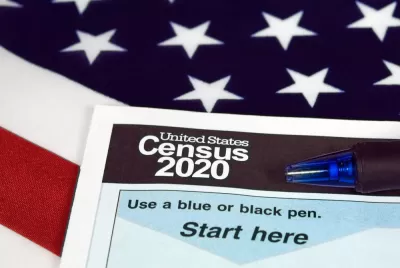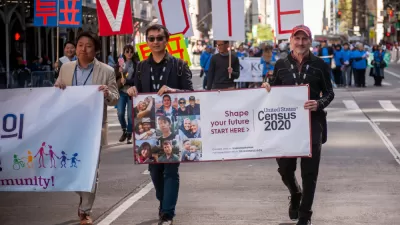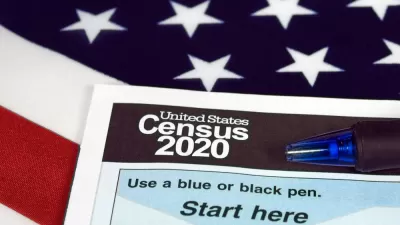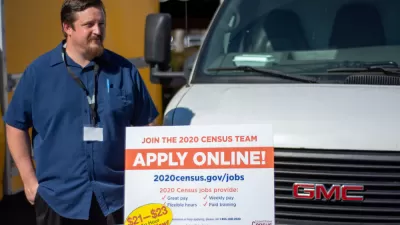The pandemic delayed the 2020 Census, and the Trump administration will cut it short. Experts say this could be the most flawed Census in the country's history.

"The Census Bureau has announced plans to cut its 2020 counting efforts short by a full month, sparking fears that many, including people of color and immigrants, could be left out this year," reports Chantal Da Silva.
"In a statement published on Monday evening, the Census Bureau said it would be ending its field data collection by September 30, a month earlier than had been expected," adds Da Silva.
The Census Bureau's response to the coronavirus pandemic forced a delay of door-to-door counting operations in April, among other changes, potentially delaying redistricting processes that depend on Census data in the following year.
"With the Trump administration’s decision to end the 2020 census count four weeks early, the Census Bureau now has to accomplish what officials have said it cannot do: accurately count the nation’s hardest-to-reach residents — nearly four of every 10 households — in just six weeks," according to an article by Michael Wines and Richard Fausset that provides additional news coverage of the Trump administration's move to cut the Census short, and how that will impact Census workers and residents of the country.
"The result is both a logistical challenge of enormous proportions that must take place in the middle of a pandemic, and yet another political crisis for the census, historically a nonpartisan enterprise. The announcement, which came Monday evening, immediately generated sharp criticism," add Wines and Fausset.
Much of the criticism was shared int he media, like an editorial from the New York Times claiming that Trump believes the Republican party's political fortunes will be improved by undercounting hard to reach populations of racial minorities and immigrants. That might be a mistaken assumption:
But the irony is that a rush to finish the counting process could hurt Mr. Trump’s own voters, too. That’s because the poorest states, which depend the most on federal funding, also tend to have lower census response rates. In West Virginia, federal funding from programs tied to the census accounted for 17 percent of economic activity in 2017, according to Mr. Reamer’s calculations. The state has one of the lowest census response rates.
According to an explainer post of the Trump administration, provided by Nicole Narea for Vox, the 2020 Census is shaping up to be one of the most flawed Census counts in history. An opinion piece for The Washington Post by Vanita Gupta, president and chief executive officer of the Leadership Conference on Civil and Human Rights, calls on Congress to intervene to ensure that the Census is able to complete its process and undertake an accurate count. An article by William H. Frey, also highly critical of the Trump administration's decision to cut the count short, also reports that the decision is being challenged in court by the New York Immigration Coalition, among others.
As reported by Adam K. Raymond, a #StealTheCensus hashtag has emerged on social media for U.S. residents to express their concerns.
As noted by many of these media outlets since the news broke about the decision to cut the count short, the Trump administration has been actively obstructing the Census since long before the pandemic began to rage across the country. Planetizen documented the Trump administration's obstructions in the following article.
- Updated: Supreme Court Falls Short of Clarity on Census Citizenship Question (June 27, 2019)
- Explained: The Risks Facing the 2020 Census (February 6, 2018)
- 'High Risk' of Failure: The 2020 Census (September 6, 2017)
- Turmoil at the U.S. Census Bureau as Director Resigns (May 10, 2017)
FULL STORY: Census Bureau to Cut 2020 Count Short, Sparking Fears Many Will Be Left Out

Maui's Vacation Rental Debate Turns Ugly
Verbal attacks, misinformation campaigns and fistfights plague a high-stakes debate to convert thousands of vacation rentals into long-term housing.

Planetizen Federal Action Tracker
A weekly monitor of how Trump’s orders and actions are impacting planners and planning in America.

In Urban Planning, AI Prompting Could be the New Design Thinking
Creativity has long been key to great urban design. What if we see AI as our new creative partner?

King County Supportive Housing Program Offers Hope for Unhoused Residents
The county is taking a ‘Housing First’ approach that prioritizes getting people into housing, then offering wraparound supportive services.

Researchers Use AI to Get Clearer Picture of US Housing
Analysts are using artificial intelligence to supercharge their research by allowing them to comb through data faster. Though these AI tools can be error prone, they save time and housing researchers are optimistic about the future.

Making Shared Micromobility More Inclusive
Cities and shared mobility system operators can do more to include people with disabilities in planning and operations, per a new report.
Urban Design for Planners 1: Software Tools
This six-course series explores essential urban design concepts using open source software and equips planners with the tools they need to participate fully in the urban design process.
Planning for Universal Design
Learn the tools for implementing Universal Design in planning regulations.
planning NEXT
Appalachian Highlands Housing Partners
Mpact (founded as Rail~Volution)
City of Camden Redevelopment Agency
City of Astoria
City of Portland
City of Laramie





























